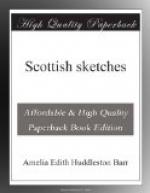But above all his life was made rich by his grandson. Nature, as she often does, reproduced in the second generation what she had totally omitted in the first. The boy was his grandfather over again. They agreed upon every point. It was the laird who taught Alexander to spear a salmon, and throw a trout-line, and stalk a deer. They had constant confidences about tackle and guns and snares. They were all day together on the hills. The works pleased the boy better than his father’s studio. He trotted away with his grandfather gladly to them. The fires and molten metal, the wheels and hammers and tumult, were all enchantments to him. He never feared to leap into a collier’s basket and swing down the deep, black shaft. He had also an appreciative love of money; he knew just how many sixpences he owned, and though he could give if asked to do so, he always wanted the dominie to give him a good reason for giving. The child gave him back again his youth, and a fuller and nobler one than he himself had known.
And God was very gracious to him, and lengthened out this second youth to a green old age. These men of old Gaul had iron constitutions; they did not begin to think themselves old men until they had turned fourscore. It was thirty years after Helen’s death when Tallisker one night sent this word to his life-long friend,
“I hae been called, Crawford; come and see me once more.”
They all went together to the manse. The dominie was in his ninety-first year, and he was going home. No one could call it dying. He had no pain. He was going to his last sleep
“As
sweetly as a child,
Whom neither thought disturbs nor care
encumbers,
Tired with long play, at close of summer’s
day
Lies down and
slumbers.”
“Good-by, Crawford—for a little while. We’ll hae nae tears. I hae lived joyfully before my God these ninety years; I am going out o’ the sunshine into the sunshine. Crawford, through that sair strait o’ yours you hae set a grand, wide-open door for a weight o’ happiness. I am glad ye didna wait. A good will is a good thing, but a good life is far better. It is a grand thing to sow your ain good seed. Nae ither hand could hae done it sae well and sae wisely. Far and wide there are lads and lasses growing up to call you blessed. This is a thought to mak death easy, Crawford. Good-night, dears.”
And then “God’s finger touched him and he slept.”
Crawford lived but a few weeks longer. After the dominie’s death he simply sat waiting. His darling Alexander came home specially to brighten these last hours, and in his company he showed almost to the last hour the true Crawford spirit.
“Alexander,” he would say, “you’ll ding for your ain side and the Crawfords always, but you’ll be a good man; there is nae happiness else, dear. Never rest, my lad, till ye sit where your fathers sat in the House o’ Peers. Stand by the State and the Kirk, and fear God, Alexander. The lease o’ the Cowden Knowes is near out; don’t renew it. Grip tight what ye hae got, but pay every debt as if God wrote the bill. Remember the poor, dear lad. Charity gies itsel’ rich. Riches mak to themselves wings, but charity clips the wings. The love o’ God, dear, the love o’ God—that is the best o’ all.”




